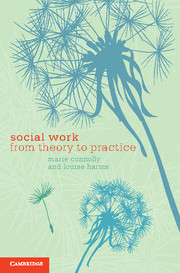Book contents
- Frontmatter
- Contents
- List of figures
- Preface
- Acknowledgements
- 1 Social work knowledge, theory and practice
- 2 Frameworks, models and practice
- 3 Ecosystems theories
- 4 Onion-peeling theories
- 5 Faulty-engine theories
- 6 Story-Telling Theories
- 7 Mountain-moving theories
- 8 Reflective practice and theory
- Concluding thoughts
- References
- Index
- References
6 - Story-Telling Theories
- Frontmatter
- Contents
- List of figures
- Preface
- Acknowledgements
- 1 Social work knowledge, theory and practice
- 2 Frameworks, models and practice
- 3 Ecosystems theories
- 4 Onion-peeling theories
- 5 Faulty-engine theories
- 6 Story-Telling Theories
- 7 Mountain-moving theories
- 8 Reflective practice and theory
- Concluding thoughts
- References
- Index
- References
Summary
HUMAN BEINGS have always gathered stories. Long before we could keep them in any recorded form, stories have been gathered as oral traditions and passed down through families for many generations. They become powerful narratives that influence human well-being and identity. In the same way as these life narratives create meaning for us, story-telling theories in social work focus on the stories we live by, as individuals, families and communities. This group of theoretical approaches proposes that stories of strength and resilience can influence how we think, feel and act. By listening to our own internalized stories and others that are shared with us, we can begin to understand both their meaning and the influence they have on the ways in which people live their lives. Story-telling theories are critically interested in this and in the ways stories can be reauthored to enable more positive and rewarding life outcomes.
Story-telling as a therapeutic process has been most fully articulated in narrative therapy. We explore throughout this chapter how narrative work enables people to cope more effectively with adversity and difficulty. Stories also transform communities and societies, and we will look at how giving voice and transforming marginalized, silenced and oppressed stories can do so. But before we explore narrative ways of working we will first look at a broader influence that has supported narratives of strength and resilience: the strengths perspective in social work practice.
- Type
- Chapter
- Information
- Social WorkFrom Theory to Practice, pp. 124 - 144Publisher: Cambridge University PressPrint publication year: 2011



